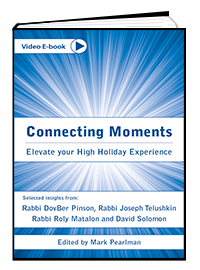

 Connecting Moments: Elevate your High Holiday Experience
Connecting Moments: Elevate your High Holiday Experience
We open the High Holidays with Selihot (prayers of penitence) and in the span of two and a half weeks we will have gone through the Yamim Noraim (the Days of Awe). How much of the Yamim Noraim will go through us? Will they be just another High Holidays or will we allow them to become a truly intense, creative, new and spontaneous spiritual adventure? Will we be uninhibited enough, authentic enough, daring enough to let an avalanche of emotions, feelings, memories, longings, prayers and insights flow in and out of our souls?
To that end, Connecting Moments is a collaboration with some of the world’s top Rabbis and teachers, who, in text and on film, share the secrets to transforming the High Holiday experience. We hope this book will help make the High Holiday time more meaningful to you – to help give you the courage to repeat what must be repeated and change what must be changed. Read on to create your own memorable High Holiday experience. L’Shana Tova.
The Month Leading up to the High Holidays
“Before every sound there is a silence that precedes the sound. Elul is associated with “silence”, which is the stillness that comes before the “sound” of Tishrei. This is illustrated by the fact that the Shofar is blown on Rosh Hashanah, the first day of the New Year directly following the final month of Elul. The Shofar blast is considered the ‘first sound’ of the year — the initiatory vibration that gives birth to the next cycle of creation. We learn from this that Elul is a time of transition, inward reflection and serious, spiritual work, which gives birth to the ‘cry’ of the birth of the New Year. ”
– Rabbi DovBer Pinson
—————————————————————————————————————————-
Rosh Hashanah & Yom Kippur
“There is something hypocritical about coming to synagogue on the High Holidays and beseeching God to look upon us favorably and treat us with mercy and forgiveness, if we are unwilling to act that way to others. The Talmud teaches that God forgives the sins of those who don’t hold grudges and who forgive offenses committed against them (Rosh Hashana 17a). Only if we act in a forgiving manner toward others do we make ourselves worthy of God’s forgiveness.”
– Rabbi Joseph Telushkin
—————————————————————————————————————————-
Connecting Moment
“By the time the High Holy Days are over, you will have spent hours in synagogue and maybe you even had a few minutes or thirty seconds of something absolutely real and deep. But those hours are worth those few minutes or seconds. In those moments when we feel really connected, there is something transcendent that happens. I can’t spell out the nature of that connection for you; it will be something unique and personal. It could be with God, with a deeper part of yourself, with the community, with the music, with the text, with your grandparents, with Israel, or with the language. There are limitless possibilities of how our connection can be sparked.”
– Rabbi Roly Matalon
—————————————————————————————————————————-
High Holidays 101
“It is impossible to convey in words the essential meaning of Rosh Hashanah and Yom Kippur because their essential meaning is ultimately experiential. What is unique about that period is that it gives us the opportunity to stand as human beings before the Creator of the universe. On Rosh Hashanah, we do not stand before God the redeemer; we stand before God the Creator, as Abraham stood before God when he realized that it is possible to have a relationship with the Creator of the universe.”
– David Solomon